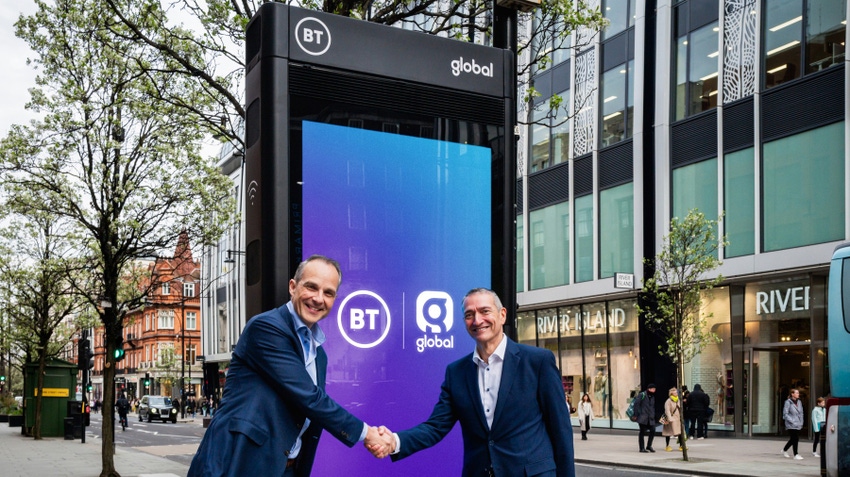Eurobites: BT agrees ten-year 'street hubs' deal
Also in today's EMEA regional roundup: Orange-Másmóvil joint merger opens for business; data center energy use set to rocket; A1 Telekom Austria bags more spectrum.

BT and media company Global have agreed a ten-year deal for the rollout of more digital "street hubs," many of them on the sites of what used to be traditional payphone kiosks. Global will also continue to handle BT's street furniture (think bus shelters) advertising sales for the next decade. The new agreement will see Global convert up to 2,000 BT pay phones and kiosks into new street hubs, with BT continuing to supply mobile and Wi-Fi connectivity to the hubs. The new hubs will offer secure gigabit connectivity to anyone within a 150-meter radius.
Rather less visibly, BT has been conducting what is claimed to be Europe's first successful field trial of optical transport in a live research network, using Adtran's Coherent 100ZR pluggable transceiver. The companies say that the trial demonstrated the transceiver's ability to enable the transport of 100Gbit/s wavelengths, over longer distances, across routes at metro and edge aggregation networks.
The €18.6 billion (US$20.1 billion) joint venture between Orange and Spain's Másmóvil, first announced in July 2022, is officially GO! With more than 37 million broadband and mobile lines, the new entity becomes the market leader in Spanish telecom in terms of customers. According to revised estimates, the new company is expected to generate "synergies" (corporate for "savings") of more than €490 million ($530 million) per year by the fourth year after the closing of the deal. Jean François Fallacher, CEO of Orange France, has been appointed non-executive chairman of the new company, while Meinrad Spenger, CEO of Másmóvil since 2006, becomes CEO.
Data center energy use will increase sixfold over the next decade, according to the boss of National Grid, the UK company that effectively manages the country's electricity supply. As the BBC reports, CEO John Pettigrew said that "bold action" was needed to establish a network able to cope with a surge in demand driven not least by the rise of artificial intelligence and quantum computing.
A1 Telekom has bagged itself frequencies in the 26GHz band as well as additional regional frequencies in the 3.5GHz band in Austria's latest spectrum auction, forking out €7.2 million ($7.8 million) for the privilege. The new licenses for the 26GHz and 3.5GHz acquisitions are valid until December 31, 2046, and December 31, 2039, respectively.
The Spanish government has bought an initial 3% stake in Telefónica with a view to gradually building it up to a 10% stake, according to a Reuters report. The government decided to take a stake in the operator in December of last year in response to the acquisition of a 9.9% stake in Telefónica by Saudi Arabia's STC a couple of months earlier.
UK-based Freedom Fibre has completed its merger with VX Fiber following regulatory approval of the deal in December. The merger creates a wholesale fiber business reaching around 300,000 premises. TalkTalk, a minority shareholder since 2021 and a long-term customer of Freedom Fibre, will retain a stake in the combined business.
The EU and South Korea have cemented their digital collaboration with the launch of a call for proposals on research topics related to 5G/6G radio access networks. Any resulting projects are expected to start at the end of this year.
Read more about:
EuropeAbout the Author(s)
You May Also Like




_International_Software_Products.jpeg?width=300&auto=webp&quality=80&disable=upscale)







